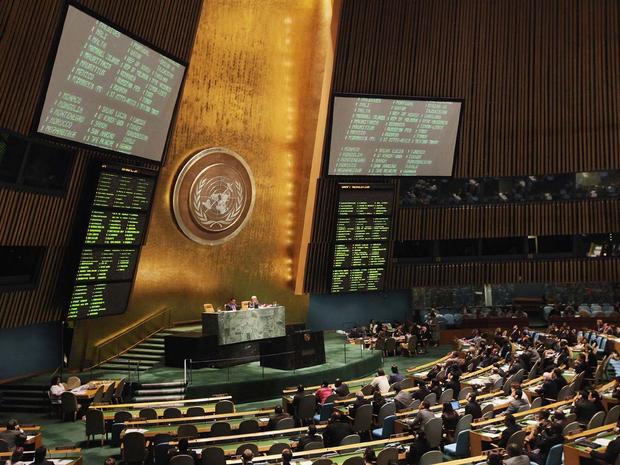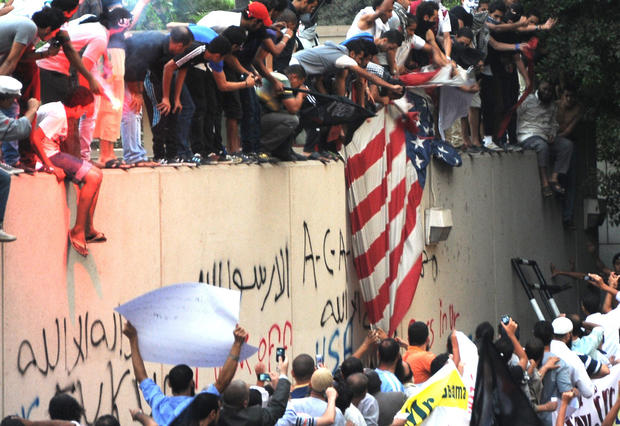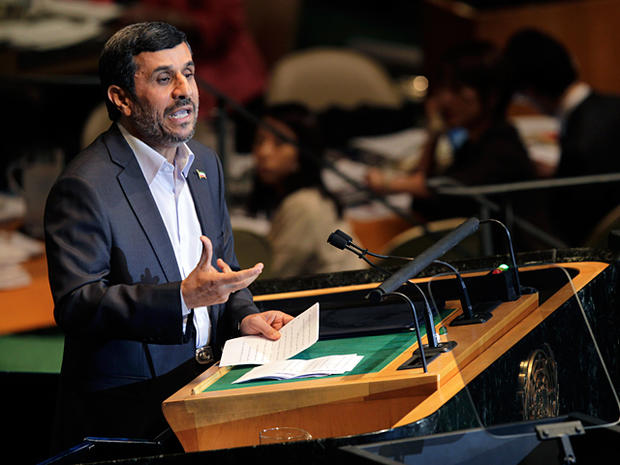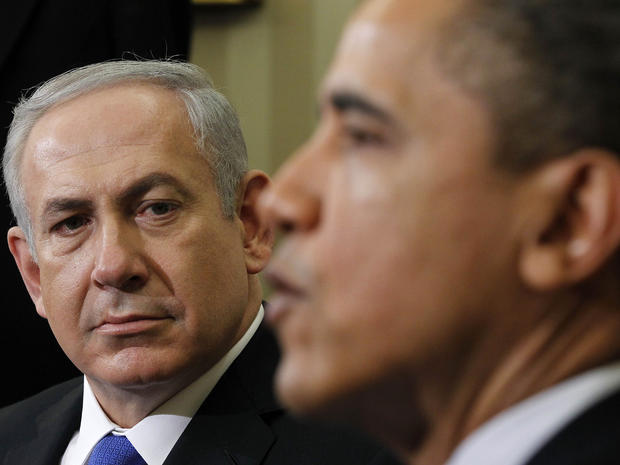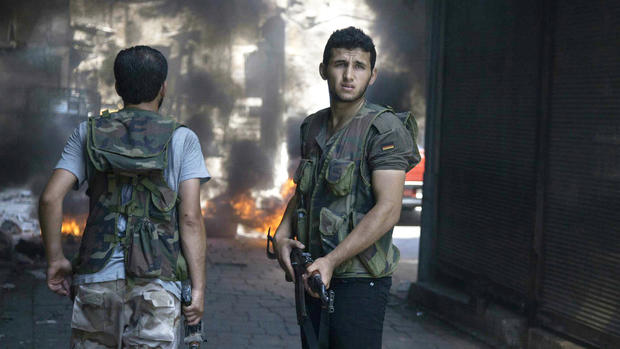What to expect from the U.N. General Assembly
(CBS News) UNITED NATIONS - The 67th regular session of the United Nations General Assembly officially opened on Tuesday, and an estimated 123 world leaders are to descend on U.N. Headquarters before the General Debate kicks off on Tuesday.
President Obama will spell out the United States' General Assembly priorities in opening remarks on Tuesday, and an early highlight for the American audience will come in looking at the differences between his remarks and almost-simultaneous remarks by Republican presidential nominee Mitt Romney, who will speak at the Clinton Global Initiative, which is also in New York.
Obama, Romney slated for dueling speeches on world stage
Secretary-General Ban Ki-moon opened the new session with a note of caution: "We are living through a period of unease. These are times of rising unemployment, rising inequality, rising temperatures - and rising intolerance."
Ban failed to mention one of the most daunting issues facing the U.N. - the complete lack of consensus among the five permanent members of the Security Council on some of the most pressing issues. Due to that impasse, much of the real work on these matters will be done on the sidelines of the General Assembly.
Here are some main themes to watch for next week:
Arab Spring aftermath
Leaders will grapple with the rocky transition of power in nations where long-time leaders were toppled by Arab Spring uprisings. In some of those nations, notably Egypt and Libya, there's been a marked uptick in violence and anti-U.S. protests as Islamic extremists struggle to assert their new roles in society and politics.
Egypt seeks arrest of anti-Islam filmmakerAl Qaeda urges killing of more U.S. diplomats
What's behind violent anti-U.S. protests in Muslim world?
Arab League Secretary General Nabil Elaraby will be in New York to provide leadership, and the heads of state of Egypt, Libya, Lebanon, Morocco, Yemen, Tunisia, Qatar and Somalia are slated to address the Assembly - though plans can change due to events in any given country.
Given the recent violence at U.S. diplomatic offices in Cairo and Benghazi, all eyes will be on Egypt's President Mohammed Morsi and President Mohamed el-Megarif of Libya.
Iran nuclear standoff
Iran continues to defy the international community - and mandates by the U.N.'s nuclear watchdog agency, the IAEA - over its suspect nuclear work.
EU, Iranian nuclear negotiators meetIran deploys Russian-made sub amid U.S. war games
Iran: "Saboteurs" may be in U.N. agency
President Mahmoud Ahmadinejad is sure to repeat inflammatory comments in his speech about Israel or the holocaust, as he has done in years past, likely provoking a walk-out by several Western delegations.
In one of the many sideline meetings where the real work of diplomacy will be done next week, France, Germany and Britain, as well as the United States, Russia and China (known as the EU3 + 3) are to meet Wednesday to try and find agreement on the best way to coax Iran back to the negotiating table. Russia and China have resisted any further sanctions against Iran, and are highly critical of any discussion of military action.
All the nations involved in the talks are permanent, veto-wielding members of the Security Council, with the exception of Germany. There have been numerous attempts to bridge the gulf between Russia and China and the other members of the group, which support tougher sanctions against Iran - thus far, to no avail.
A notable non-meeting
Iran's intransigence on demands to open up its nuclear program to international scrutiny has spawned a secondary diplomatic battle.
Israel has been pushing the Obama administration for a clear and public indication - a so-called "red line" - as to when the U.S. would use military force against Iran if the Islamic Republic keeps refusing to cooperate. Israeli Prime Minister Benjamin Netanyahu has threatened to launch a unilateral military strike on Iran's nuclear facilities despite warnings from the U.S. - and from members of his own government and military - that Israel on its own would likely be unable to halt Iran's nuclear program.
Netanyahu compares Iran to Timothy McVeighU.S. strike on Iran would risk all out Mideast war, experts say
White House: No rift with Israel over Iran
Netanyahu and Ahmadinejad will be two of the most closely watched speakers of the General Debate.
But one meeting has made news already for the fact that it will not take place on the sidelines of the Assembly; a private chat between Mr. Obama and Netanyahu. With tension high between the two leaders, the much-discussed bilateral meeting was never arranged - because of scheduling conflicts, according to their offices. Obama leaves after his opening speech on Tuesday, and due to the Jewish Yom Kippur holiday, Netanyahu doesn't arrive in New York until Thursday.
Scheduling conflicts aside, the fact that a way for the two men to be in the same place at the same time couldn't be found has been called a snub by some Israeli officials, and it further strained the ties between Washington and Jerusalem.
Syria's civil war
Syria is imploding in a civil war which is spilling into neighboring countries with potentially explosive ramifications for the entire region. Again, Russia and China stand against the rest of the Security Council, adamantly opposing harsher measures against President Bashar Assad.
Rebels seize Turkey border crossingVideo: Safety, but little hope for Syrian refugees
U.K. Ambassador and Permanent Representative, Sir Mark Lyall Grant says, although there is not a meeting per se on Syria, the crisis will be addressed in several events.
First, Lyall Grant says Security Council members will meet to discuss the Council's relationship with the Arab League (which says Assad must go); second, there's likely to be a meeting of the "Friends of Syria" group - comprised of the U.S. and other nations which also insist Assad must step down - who are working together with the Syrian opposition on plans for a post-Assad Syria; and third, he says there will probably be a meeting of foreign and development ministers to galvanize support for refugees and internally displaced Syrians.
President Bashar Assad himself, needless to say, will be a no-show. Syria will instead send a cabinet-level official from Assad's regime, who will speak on the last day of the debate.
Presidents Vladimir Putin and Hu Jintao, of Russian and China, respectively, have also elected to sit this General Assembly out.
In summary
The United Nations is good on some things. It helps settle large refugee populations, sends peacekeeping forces into post-conflict areas, helps children in areas of extreme poverty, battles for the advancement of women around the globe, and responds effectively to natural disasters. All of that work is done on a daily basis, by armies of lower-level staff around the world.
But 2012 has not been a banner year in resolving any of the complex challenges facing United Nations member states, and frustration over the inability of the United Nations members to agree on anything substantial toward reversing that trend will likely be the real theme to emerge from New York next week.
Click here for the official list of leaders who are expected to attend the General Assembly.
